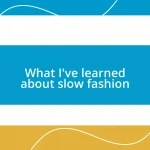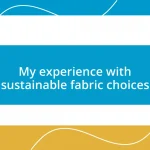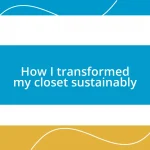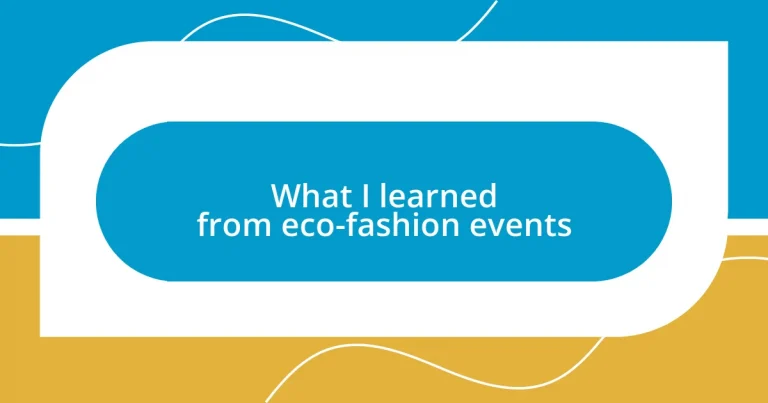Key takeaways:
- Eco-fashion emphasizes sustainability, ethical labor practices, and the circular economy, redefining our relationship with fashion.
- Consumer awareness and storytelling in fashion can drive change, encouraging brands to adopt sustainable and ethical practices.
- Future trends include the integration of innovative technologies like 3D printing, circular fashion systems, and increased transparency in supply chains.
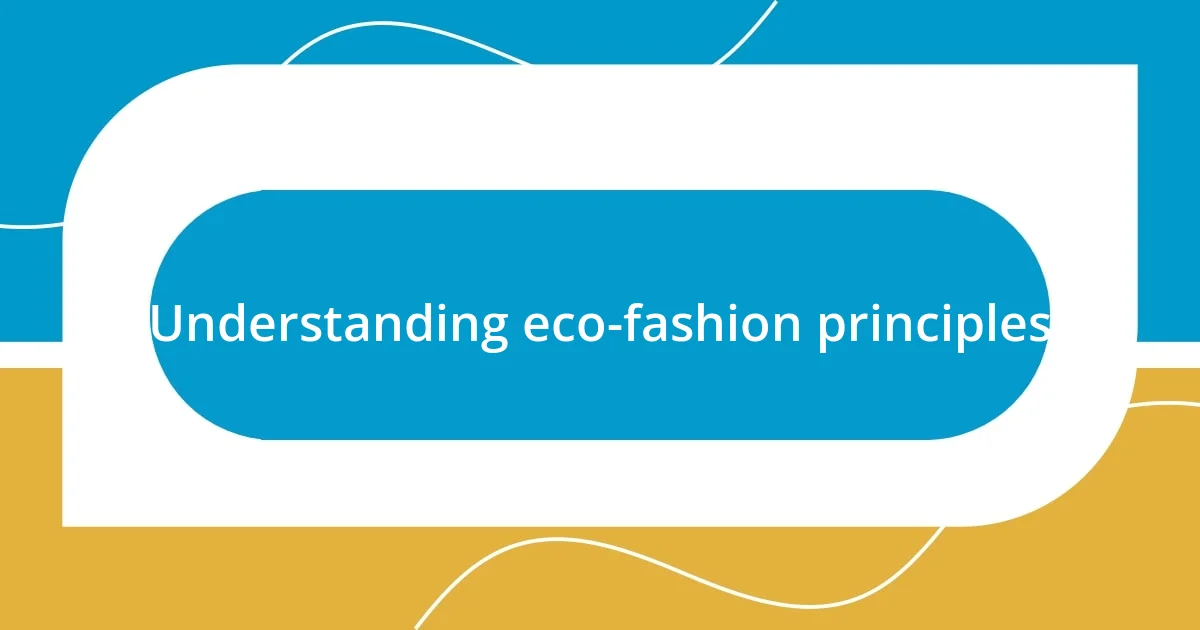
Understanding eco-fashion principles
Eco-fashion principles center on sustainability, ethical production, and a deep respect for the environment. During an eco-fashion event I attended, I was struck by how designers shared their commitment to using organic materials, which made me question my own choices. Have you ever thought about where your clothes come from? It’s an eye-opener when you realize that even the fashion industry can operate in harmony with nature.
Another key principle is the emphasis on fair labor practices. As I listened to a designer explain how she collaborates with artisans in developing countries, I felt a genuine connection to her mission. It reminded me that fashion isn’t just about aesthetics; it carries stories and lives. This drives home the importance of fostering a sense of community where everyone involved is treated fairly.
Finally, the circular economy is a foundational element in eco-fashion. I recall seeing a collection made entirely from upcycled materials, and I couldn’t help but feel inspired. It’s incredible to think that something discarded can be transformed into a new piece of art. Isn’t it amazing how redefining waste can change the entire narrative of fashion? This principle not only reduces waste but encourages creativity and innovation in the industry.
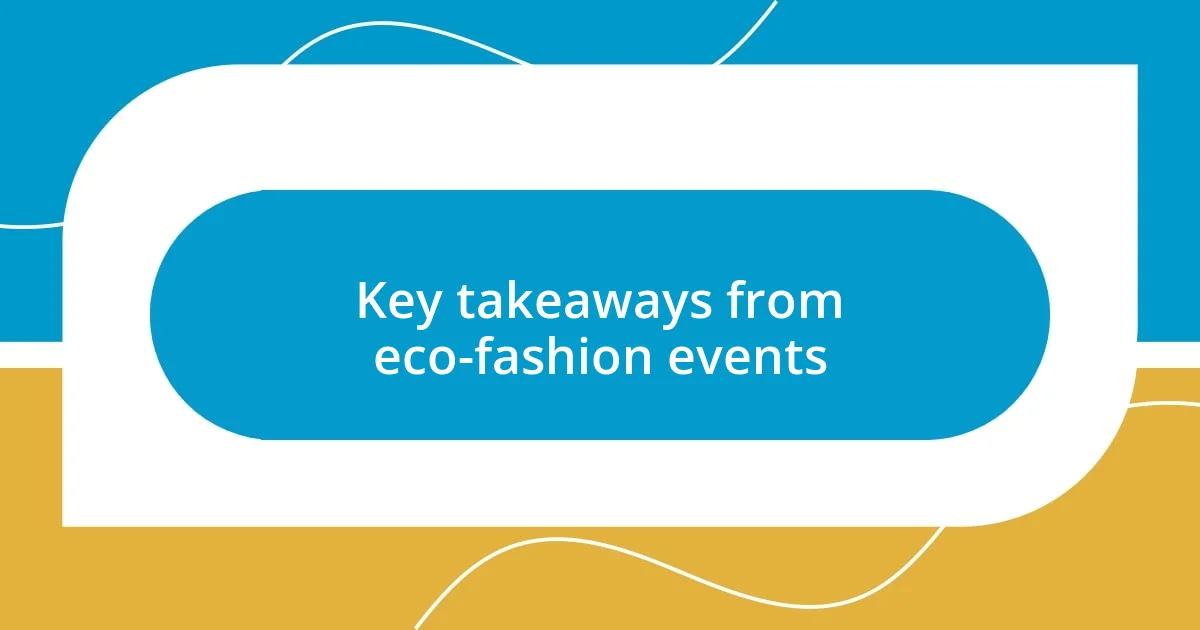
Key takeaways from eco-fashion events
Attending eco-fashion events has provided me with profound lessons about the impact of conscious choices. One takeaway that resonated deeply with me was the power of storytelling in fashion. I remember sitting in the front row, captivated as a designer shared her journey from sourcing sustainable fabrics to uplifting her local community. It really hit home when she said, “Every thread tells a story.” Have you ever considered how your clothing carries its own narrative?
Another important insight is the role of innovation in sustainability. During one event, I walked through a showcase that featured garments created using advanced technologies, like fabric made from recycled ocean plastics. Witnessing this blend of creativity and sustainability sparked a realization: fashion can be a catalyst for change. As I examined those pieces up close, I couldn’t help but think about the positive impact we can all make by supporting innovative practices in our wardrobe choices.
Lastly, connecting with like-minded individuals at these events has been invaluable. Through conversations, I’ve learned that eco-fashion isn’t just a trend; it’s a movement fueled by shared values. One specific conversation with a fellow attendee stayed with me. We discussed how small changes in our buying habits can ripple through the entire industry. This collective awareness is essential in pushing for a more sustainable future in fashion.
| Key Takeaways | Insights |
|---|---|
| 1. Power of Storytelling | Every garment has a unique narrative shaped by the designer’s journey and ethical choices. |
| 2. Innovation in Sustainability | Advanced technologies can transform recycled materials into fashion, showcasing potential for a positive environmental impact. |
| 3. Community Connection | Building relationships with others in eco-fashion enriches our understanding of collective responsibility. |
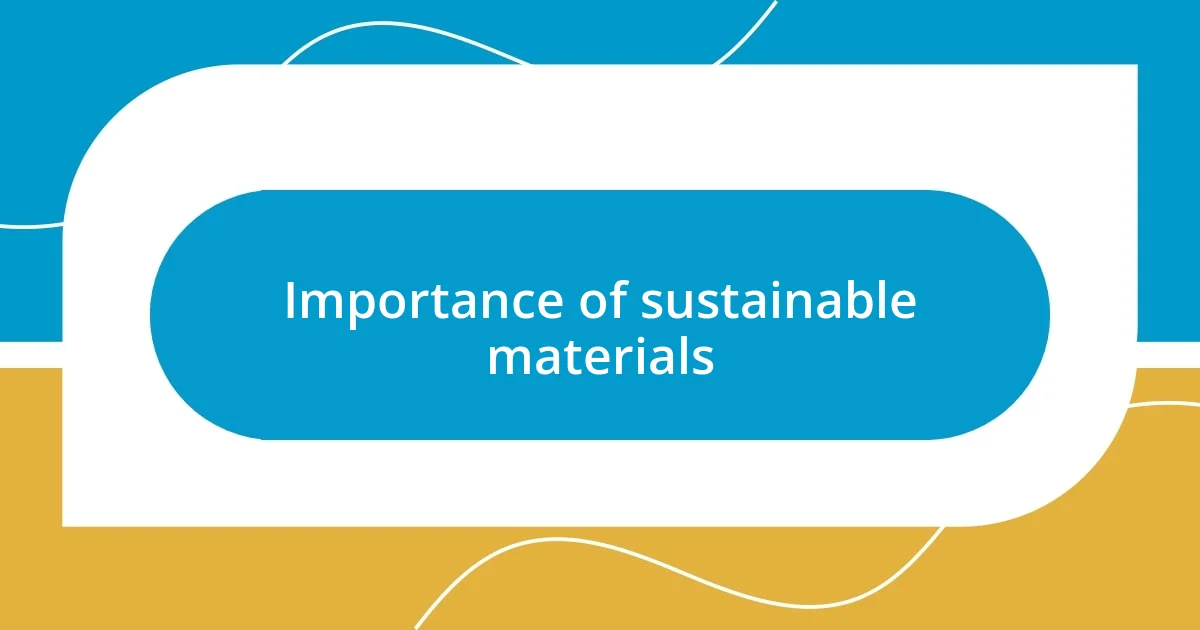
Importance of sustainable materials
Sustainable materials play a crucial role in transforming how we approach fashion. I vividly remember a moment at one event where a designer showcased garments made from organic cotton and Tencel, a fiber derived from sustainably sourced wood pulp. It was fascinating to learn how these fabrics not only reduce our environmental footprint but also promote healthier farming practices. The deeper I dive into eco-fashion, the more I understand that choosing sustainable materials can mean supporting entire ecosystems.
When considering the importance of sustainable materials, several key benefits come to mind:
– Reduced Environmental Impact: Sustainable materials often require less water and energy, decreasing the overall carbon footprint.
– Biodiversity Protection: Many sustainable fabrics are grown without harmful chemicals, helping to preserve ecosystems and protect wildlife.
– Improved Quality and Durability: Ethically sourced materials tend to be higher quality, resulting in longer-lasting garments that withstand the test of time.
– Healthier Choices: Fabrics that are organic or free from toxic dyes contribute to better health for consumers, as they reduce exposure to harmful substances.
– Support for Fair Trade Practices: Many sustainable materials are linked to fair labor practices, ensuring that artisans and farmers receive fair compensation for their work.
I truly believe that every purchase is a vote for the planet. When I pick up a garment made from sustainable materials, I can’t help but feel a sense of pride in making conscious choices. It connects me to a larger community of conscious consumers, all striving for a healthier planet. Isn’t it rewarding to think that with every mindful decision, we’re contributing to a collective shift toward a more sustainable future?
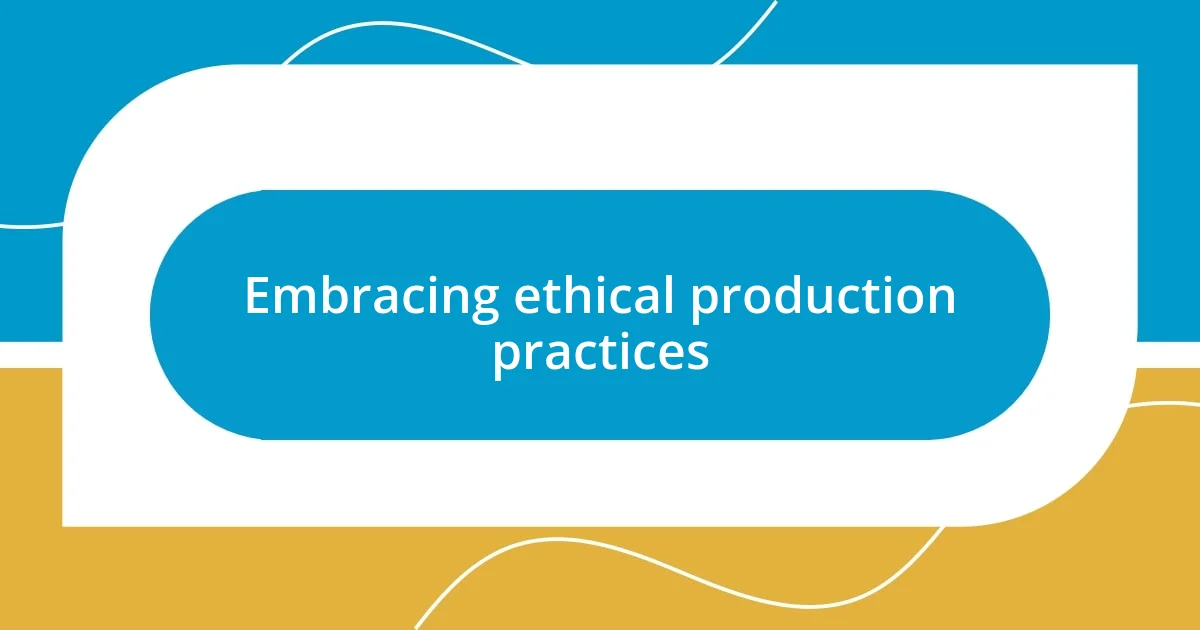
Embracing ethical production practices
Embracing ethical production practices has opened my eyes to a world where fashion aligns with values. I remember a designer at one eco-fashion event talking passionately about her commitment to transparent supply chains. She shared how every worker involved in the production process is paid fairly and treated with respect. This sparked a realization for me: When we support brands that prioritize ethics, we’re not just buying clothes; we’re investing in the lives of real people. Have you ever thought about who made your clothes?
I find it fascinating that ethical production isn’t merely about being eco-friendly; it’s a multifaceted approach that includes labor rights and environmental responsibility. At one event, I engaged with a brand that utilized local artisans who craft each piece by hand. The attention to detail and the story behind each item resonated deeply with me. It made me reconsider the fast fashion mindset—I could feel a strong connection to the craftsmanship that went into my purchase. This kind of knowledge transforms a mundane shopping experience into a meaningful discovery.
Moreover, the emotional impact of supporting ethical practices cannot be underestimated. I often reflect on the profound sense of fulfillment that comes when I choose to buy from brands committed to ethical production. It’s not just about the clothes I wear; it’s about being part of a movement that values humanity and sustainability. The next time you shop, I invite you to ask yourself: Does this brand reflect my values? Each thoughtful choice we make can pave the way for a more compassionate fashion industry.
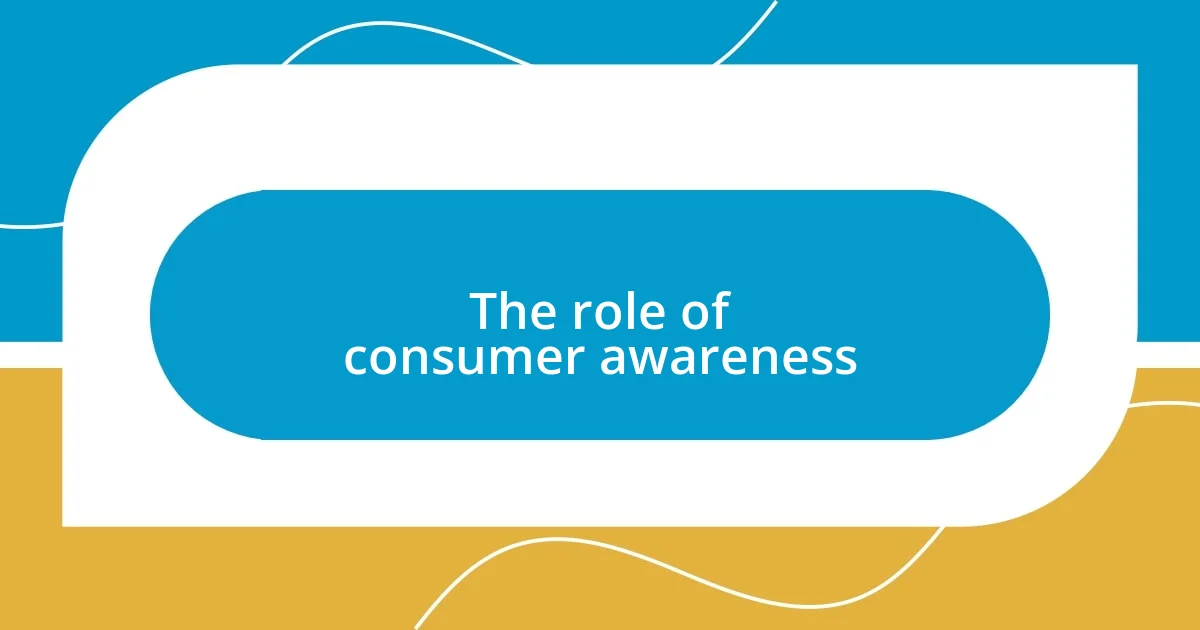
The role of consumer awareness
Consumer awareness plays a pivotal role in the eco-fashion conversation. At one event, I found myself in a lively discussion with fellow attendees about the significance of informed choices in the fashion industry. It dawned on me that when consumers are aware, they can drive entire brands to embrace greener practices, essentially using their power to influence the marketplace. Have you ever considered how your buying habits could shape the industry?
The moments of enlightenment I’ve experienced at eco-fashion events often revolve around consumer education. I’ll never forget watching a documentary clip showcasing the environmental toll of fast fashion. It made me realize how crucial it is for consumers to understand the implications behind their purchases. Armed with knowledge, we become more than just shoppers—we become advocates for change. Isn’t it amazing to think that our decisions can echo much further than our wardrobes?
I’ve witnessed firsthand how passionate conversations about sustainability can spark change in community attitudes. I remember chatting with a brand representative who shared that they’ve seen a surge in demand for eco-friendly options simply because more consumers are asking questions. This emphasizes a key principle—I truly believe that when we are collectively aware and vocal, we can encourage brands to prioritize sustainability. It makes me wonder: what if every consumer engaged with fashion in this way? The potential for transformation is profound.
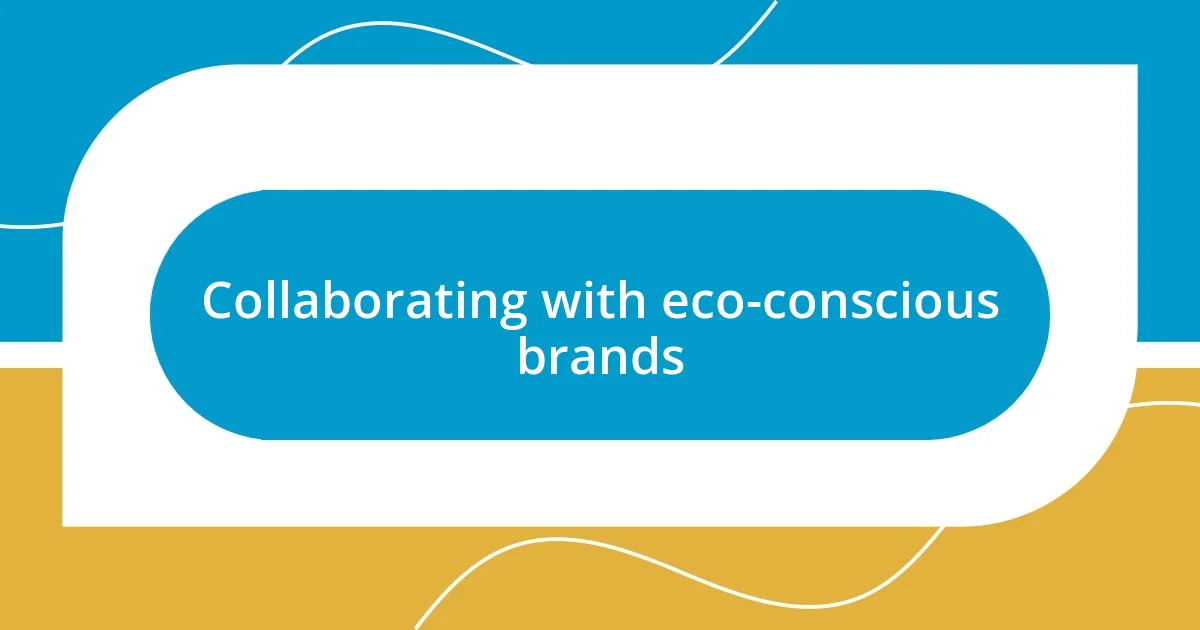
Collaborating with eco-conscious brands
Collaborating with eco-conscious brands has been a rewarding journey that has enriched my understanding of the fashion landscape. I fondly recall a collaborative project with a small eco-friendly label that aimed to educate consumers on sustainable practices. Working together, we organized a workshop where designers shared their stories, and attendees learned about the materials used. The excitement in the room was palpable, and it reminded me of how much passion exists within these communities. Have you ever participated in a collaboration that felt like more than just a transaction?
Participating in these collaborations also deepens my appreciation for the craftsmanship involved in eco-fashion. During one event, a partnership with a vegan leather brand allowed me to witness the entire process from raw materials to finished product. It was eye-opening to see the dedication that goes into creating environmentally-friendly alternatives. I was struck by the difference it makes to support brands that genuinely care about their ecological footprint. It makes me wonder—how often do we stop to appreciate the artistry behind sustainable fashion?
The emotional impact of working with eco-conscious brands is another layer I cherish. Each collaboration imbues a sense of purpose in my work. One memorable experience was teaming up with a local startup focused on upcycling materials; it ignited a sense of creativity and sustainability. Seeing pieces come alive from discarded items reminded me that fashion can make a statement while being kind to the planet. How inspiring is it to think that our choices can contribute to a larger movement toward sustainability? Each partnership not only enriches my journey but also cultivates a community that champions ethical practices.
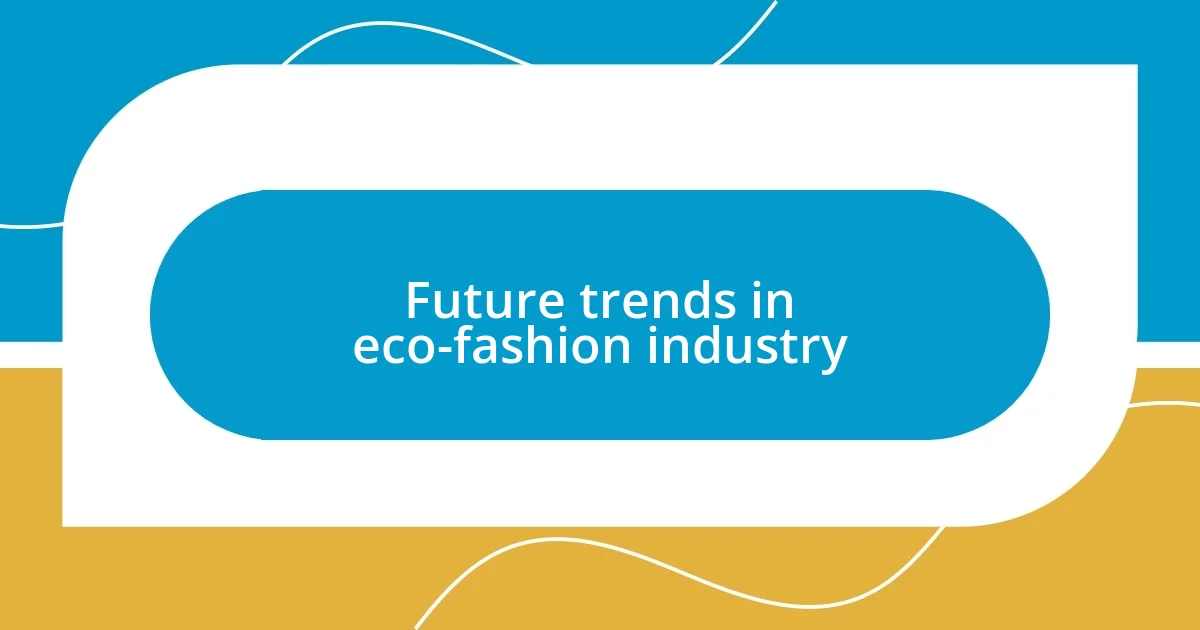
Future trends in eco-fashion industry
The future of the eco-fashion industry is vibrant and evolving, driven by innovative technologies. I recently attended a panel discussion where experts highlighted the potential of 3D printing in reducing waste. Imagine being able to customize your clothing right at home, all while minimizing the environmental impact—it’s a game-changer! Have you ever thought about how technology can reshape our relationship with fashion?
Another exciting trend I’m witnessing is the rise of circular fashion systems. At one eco-fashion event, I heard a brand’s CEO passionately describe their take-back program, where customers can return old garments for recycling or refurbishing. It struck me how this not only encourages responsible consumption but also fosters a sense of community and shared responsibility. Doesn’t that create a stronger bond between consumers and brands?
Finally, there’s an increasing focus on transparency and ethics within the supply chain. During a recent workshop, I interacted with designers openly discussing their sourcing decisions and labor practices. I felt a genuine connection to their struggle for accountability in the industry. How reassuring is it to know that we’re moving towards a system where we can truly trust what we wear? This commitment to openness is vital as we all navigate our choices in a complex world of fashion.


